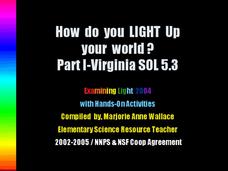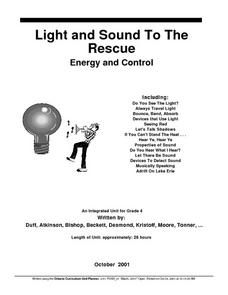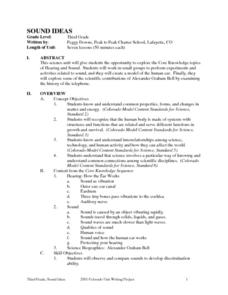Core Knowledge Foundation
Third Grade Skills Unit 5: Adventures in Light and Sound
Light and sound are the themes of a unit focused on third-grade skills. Scholars practice spelling patterns, grammar—adverbs, adjectives, synonyms, writing sentences with conjunctions, and listening and responding to read-aloud. Over...
Core Knowledge Foundation
Light and Sound Tell It Again!™ Read-Aloud Anthology
Light and sound are the running themes of a read-aloud anthology. Over three weeks, third graders listen to discuss readings in preparation for completing extension activities. Pupils work through the writing process to compose an...
Scholastic
Study Jams! Light
Let there be light in your classroom with a video that explains that light travels in waves, the electromagnetic spectrum contains seven colors, and the color of an object depends on which light waves it reflects and absorbs. With...
Scholastic
Study Jams! Sound
Listen in as Mia and Sam expound on sound. It is caused by vibrations and travels in waves. It has the qualities of pitch, frequency, and volume. This hip animation displays a graph to depict the frequency and amplitude of sound waves....
Urbana School District
Light
You matter, unless you multiply yourself by the speed of light ... then you energy. Presentation covers the behavior of light as both a wave and a particle, light versus sound, space travel, why objects have colors, depth perception,...
Science 4 Inquiry
Battle of the Waves
Which travels faster, light or sound? Scholars work in groups to simulate the ability for waves to travel through solids, liquids, gases, and through a vacuum. Then, they learn about the properties of a mystery wave and must determine...
G. Turrell
Science Activity 1: Light & Sound
Are you looking for lab sheets to go with your class experiment on plant response to light? You are no longer in the dark! This is a lesson that was written for a unit on light, but could easily be used to demonstrate plant behaviors in...
G. Turrell
Science Activity 2: Light & Sound
Little learners experiment with sunlight and map out how light travels. Using a mirror and slotted card, they find out about items that can reflect or absorb the light. They experiment with a variety of materials to find out how light...
Curated OER
How Do You Light Up Your World?
A fabulous presentation on light is here for you. In it, learners view slides which cover many important concepts of light. They understand exactly what light is, what the main sources of light are, what opaque, transparent, and...
Curated OER
Physics: Light and Sound
Students explore the concepts of light waves and sound waves. In this physics lesson, students complete activities that require them to investigate how light and sound waves travel.
Scholastic
Study Jams! Light Absorption, Reflection, & Refraction
Zoe and RJ are trying to photograph an egret on a lake, but they are having trouble with the lighting. Reflection, refraction, and absorption are explored through their thoughtful dialogue so that your physical scientists are illuminated...
Curated OER
How Do You Light Up Your World?
A tremendous presentation on the properties of light. Young scientists are treated to slides which share a lot of fascinating information about light. This impressive PowerPoint is filled with great photos, graphics, and discussion...
Curated OER
Light And Sound To the Rescue
Fourth graders use the design process to construct devices that send distress signals through air and water for purposes of rescue. They construct devices that use light and sound to assist in nautical rescues and use the knowledge...
Curated OER
Sound Busters
Fourth graders engage in a study of sound pollution at their school. After a class discussion on what noise pollution is, learners are asked if they think there are areas of their school or community where noise pollution is a problem....
Curated OER
Sound Ideas
Complete a unit of lessons on hearing and sound. Learners conduct sound experiments, research the history of the telephone and scientific contributions of Alexander Graham Bell, and create a model of the human ear.
Curated OER
Fourth Grade Science
In this science worksheet, 4th graders complete multiple choice questions about electricity, the sun, sound, and more. Students complete 25 questions.
It's About Time
Speedy Light
We know the speed of light, but can we measure the speed of dark? During the lesson, scholars perform gedanken, or thought experiments related to the speed of sound and the speed of light.
Discovery Education
Sonar & Echolocation
A well-designed, comprehensive, and attractive slide show supports direct instruction on how sonar and echolocation work. Contained within the slides are links to interactive websites and instructions for using apps on a mobile device to...
Curated OER
Electricity Review
Are there different types of energy? Yes there are! Learn about the differences between heat, sound, light, and movement energy as they relate to electricity. This informative presentation could provide more detail explaining how light,...
Curated OER
Light
Light is such a fascinating subject. This lesson does a great job of illuminating the mysteries of light for your young scientists. A series of demonstrations which are explained in the plan should help your charges to understand how...
Curated OER
Keeping Warm: Science Review Game
Test the class on what they know about thermal conduction, insulation, and heat. This interactive game provides 15 questions related to the science of temperature, heat, and cold. Keep your class warm with a fun review game!
Curated OER
Sound Energy
Sixth graders understand properties and behavior of heat, light, and sound. They describe the production of sound in terms of vibration of objects that create vibrations in other materials. Students describe how sound is made from...
Curated OER
Waves
Light waves and sound waves are the focus of this science lesson designed for 5th graders. Besides discovering how these waves travel, learners also discover the basic properties of waves, and analyze data tables and graphs. The...
Curated OER
What is Sound?
Second graders discuss sound and describe them. In this investigative lesson students observe sound through their eyes, bodies and ears.
























